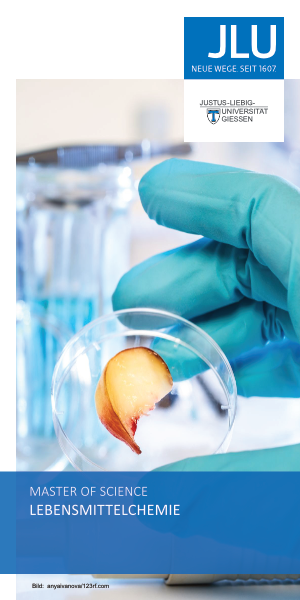Food Chemistry (M.Sc.)
Taught in German
Overview
-
Picture: Anna Ivanova/123rf.com
- Overview
-
Overview
Since winter semester 2007/08 students have been able to enrol in the Bachelor's course in Food Chemistry at Justus-Liebig-University Gießen. In the winter semester 2010/11 a consecutive Master's course was started. As a result JLU Gießen is the only tertiary institution in Hesse at which degree programmes in the area of food chemistry are offered, thus ensuring that the training to become a food chemist, which is absolutely necessary for consumer protection in Hesse, is in place.
The Master's degree course Food Chemistry is remarkable for its emphasis on interdisciplinary aspects as many classes from different departments and faculties are part of the study plan.
The degree course imparts deeper knowledge of all the important areas of nutrition chemistry.This implies a solid knowledge of food chemistry, the chemistry and analysis of drinking water and waste water, food toxicology, food technology, quality management, food safety and food law. Apart from that, the subjects of study include: environmental analysis, articles of daily use and cosmetics and animal feed. Current developments in food chemistry are covered by classes on immunological and molecular processes in food analytics (e.g. allergens, genetically modified food), through to molecular sensory analysis (odorous and flavouring substances, flavour enhancers).
The final Master's thesis gives the students access to a complex set of food chemistry questions and problems to be answered/solved in a structured way, teaching, at the same time, typical skills for problem solving in practice and research.
The Giessen degree courses are characterized by the careful attention they give to current developments and problem areas in food chemistry today. In these the emphasis is placed on the study and legal analysis of our most important food – drinking water – and also animal feed. With the reliable detection and quantification of contamination, the presence of allergens, genetically modified food or food ingredients, the requirements of German food and feed code are taken into account. A specialization in food biotechnology is possible within the framework of the elective module and in-depth placements.
- Duration of studies 4 Semester 120 Credit Points (CP)
-
Duration of Studies
4 Semesters - 120 Credit Points (CP)
-
Accreditation
since 10 December 2010
Composition of the Study Programme
- Composition of the Study Programme
-
Composition of the Study Programme
The Master's course Food Chemistry (MSc) has a duration of 4 semesters (= 2 years). The course consists of 17 modules in five main areas as shown below:
- Basics of National Food Law and Company Visit
- Principles of Dietetics
- Knowledge of Chemistry and Microbiology of Food, Articles of Daily Use and Cosmetics
- Acquisition of fundamental knowledge of instrumental high-performance analysis
- Learning the principles of independent academic working
1st semester (30 CP) 2nd semester (30 CP) Chemistry and Analysis of Water (9 CP) Quality Management, Food Safety and Novel Food (6 CP)
Special Biochemistry of Nutrition (3 CP) Basics of European Food Law & Company Visit 2 (4 CP)
Chemistry and Analysis of Animal Feed (8 CP) Chemistry of Articles of Daily Use and Cosmetics (9 CP) Food Technology 1 (3 CP) Environmental Analysis and Ecotoxicology (8 CP) Basics of National Food Law & Company Visit 1 (4 CP) Food Technology II (3 CP) Microbial Diagnostics (3 CP) 3rd semester (30 CP) 4th semester (30 CP) Food Toxicology (5 CP) Master Thesis (30 CP) Molecular Sensory Analysis (3 CP) Immunological and Molecular Biological Methods of Food Analysis (4 CP) Project Work (Overall Analysis) (12 CP) Additional Qualification / Compulsory Elective Module* (6 CP) -
Further Information
A description of the core- and specialisation modules can be found in the special regulations with module descriptions and module plans (in German)
More on this... ("Spezielle Ordnung")
Courses offered in the course catalogue
- Electronical course catalogue (in German)
Application
- Commencement of Studies in the Winter Semester
-
Commencement of studies
Only possible in the winter semester
- Application: Entrance requirements
-
Entrance Requirements
The requirement for acceptance into the Master's course is a completed Bachelor's degree in Food Chemistry with a final mark of "good" or better.
The board of examiners can accept other courses of study as equivalent after examining them individually. The previous studies must show the following academic profile: Broad education in natural sciences including appropriate basics in chemistry, mathematics, physics, biology (generel biology and specific botany) and informatics. A focus on chemistry or close to chemistry, physics or biology must be clearly recognizable.
- Application not limited only winter
-
-
Application / Enrolment
-
The study programme is not subject to admission restrictions.
-
The enrolment period for the winter semester begins at the beginning of June.
-
The end of the enrolment period is determined anew each year, please enquire in the application portal during the enrolment period.
Different rules apply in some cases for international applicants. More...
-
-
Career Options
International
- Incomings
-
Information about studying at Justus Liebig University Giessen (incomings)
International Office
General counseling of international students
Dr. Saltanat Rakhimzhanova, Patrycja Zakrzewska
Goethestr. 58, Room 38
35390 Giessen
Contact and office hours
- International pages
-
Please have a look at our International Pages for more information in English.
Further Information
- Further Information: Documents
-
PDF documents for the courses of study
- Study guide (in German)
Examination- and study regulations
- Special regulations (in German)
(with module descriptions and module plans) (in English
(Please note that only the German version of the modules is offical and legally binding. The english Version is for informative purposes only.) - General study regulations for modular and multi-stage study programmes
Courses offered in the course catalogue
- Electronical course catalogue (in German)
- Study guide (in German)
- Master's Degree Programmes of Faculty 08
- International pages
-
Please have a look at our International Pages for more information in English.
- Any Questions
-

Any Questions?
Information- and advisory services of JLU can be found under the category “contact” on this page!
Contact
-
Subject Advisor
- Subject Advisor
-
Prof. Dr. Gerd Hamscher
Institut für Lebensmittelchemie & LebensmittelbiotechnologieHeinrich-Buff-Ring 58
35392 Giessen
Phone: +49 (0)641 - 99 34950
Gerd.Hamscher@lcb.chemie.uni-giessen.deOffice hours: by appointment
-
Links
-
Central Study Advisor
- Anja Staffler
- Central Student Services
-
- Students office →
(for formal matters like matriculation) - Central student advisory office
(advice for students & prospective students) - Hotline Call Justus
(first contact for all matters pertaining to studies) - International office →
(for international students)
- Students office →

